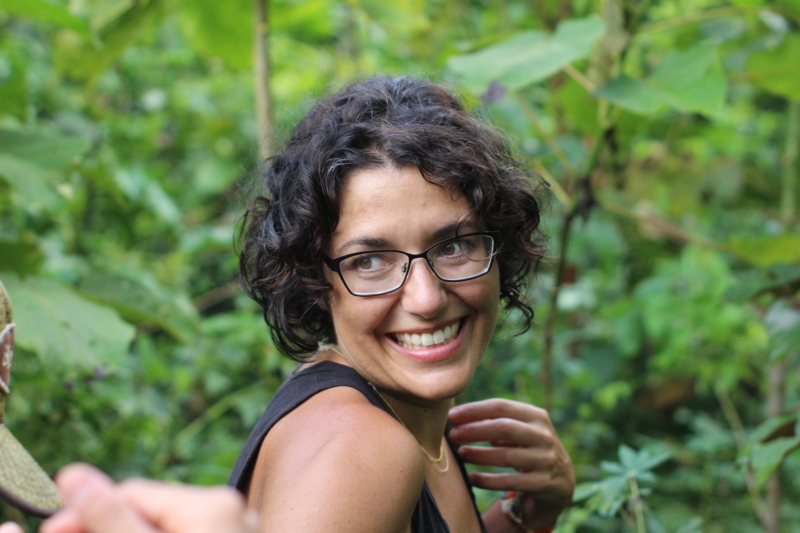Berta Martin Lopez is Professor of Sustainability Science at Leuphana University. In her research she examines how values, knowledge and institutions influence the change towards a more sustainable society. Berta emphasizes the interdisciplinary nature of her research and the importance of local knowledge and social perceptions for the governance of socio-ecological systems. In addition to her research, Berta was also one of the authors of the review of the goals for sustainable development coordinated by the International Council of Science and Humanities (ICSU). Also known as the SDGs. It is clear that her voice and opinion is in high demand. At the same she is a very reflected and she decided last month to resign from her position as a member of the advisory board of Lemonaid & ChariTea Foundation. Corona keeps teachers on their toes and the importance of the topics she is researching has not diminished at all. We spoke with her in the middle of the year about sustainability and justice, the importance of SDGs and their implementation in the Global South and want to say THANK YOU for your support and the important perspective.
To pick you all up before the interview begins: The SDGs are part of the global sustainability agenda “Agenda 2030“, which was adopted by the UN member states in 2015. It comprises a total of 17 goals and 169 sub-goals and aims at a worldwide sustainable development on an economic, social and ecological level until the year 2030.
What role do SDGs play in the change towards a more sustainable way of life?
SDGs are the guideline for promoting a more sustainable and equitable future for all. As these goals have been accepted worldwide and adopted by all member states of the United Nations in 2015, they can be seen as a universal call for action to end injustice and protect the biosphere.
What do you see as the biggest challenges for the implementation of the SDGs?
The universal character of SDGs is the greatest strength, but also the greatest challenge. Global sustainability initiatives gain momentum and impact through SDGs. However, it is less clear how SDGs are implemented at the local level and how site-specific initiatives provide complementary insights to support this global movement towards sustainability.
Sustainability solutions that work in one place may fail in another. Therefore, global solutions should not be the only answer, even if SDGs provide a framework for action. To achieve global sustainability goals, it is essential to learn from local initiatives and act at the local level, taking into account the different realities.
How can the preservation of local knowledge systems help to implement SDGs?
The transformation towards sustainability is often triggered at the local level, through local initiatives based on indigenous and local knowledge systems. Indigenous peoples and local communities are particularly well placed to contribute to sustainability because they have an intrinsic interest in preserving the ecosystems in which they live and benefit, and because they have an intimate knowledge of their territories and the processes that take place within them. Their knowledge-based attachment to their territories is one of the main driving forces in the search for solutions that are sustainable and fair.
What is needed to implement SDGs together with partners in the Global South?
There are hundreds of sustainability initiatives in Asia, Africa and Latin America. Although these initiatives address different aspects of sustainability, those that are more successful in implementing SDGs have some commonalities. First, their vision and mission are aimed at strengthening human-nature connections and human relationships fostered by being in nature. Second, they draw on the knowledge systems that indigenous peoples and local communities have. They respect indigenous and local knowledge and incorporate it into the whole development of the initiative, from the design to the development of the results. Third, they are organized and managed through bottom-up structures that respect and involve local communities and indigenous peoples. Any attempt to implement initiatives to achieve SDGs necessarily requires consideration of these three aspects.
What can we learn from countries of the Global South in terms of SDG implementation?
As Harini Nagendra clearly stated in this article published in 2018, the initiatives and movements promoting sustainability in Asia, Africa and Latin America have some commonalities from which we can learn a lot. First, these initiatives emphasize environmental justice and social justice. They recognize that there is no sustainability without justice. Sustainability and justice go hand in hand. Secondly, as I indicated above, successful sustainability initiatives in Asia, Africa and Latin America are based on local people, their knowledge and their culture. Often women, who also fight for gender justice, lead these initiatives. Thirdly, the rights of nature are emphasized and have the same status as human rights. What they have in common is that they give space to nature, establish kinship relations with the elements of nature and consider them sacred. In summary, by witnessing sustainability initiatives in Asia, Africa and Latin America, we can learn how-to live-in harmony with nature.
Photocredit: Nghilinawa Lolonyo Heita Natusch



